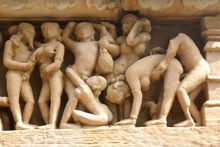Difference between revisions of "Orgy"
(Created page with 'File:lighterstill.jpgright|frame ==Etymology== Middle French orgie, from Latin orgia, plural, from Greek; akin to Greek ergon [[wo...') |
m (Text replacement - "http://" to "https://") |
||
| Line 3: | Line 3: | ||
==Etymology== | ==Etymology== | ||
Middle French orgie, from [[Latin]] orgia, plural, from [[Greek]]; akin to Greek ergon [[work]] | Middle French orgie, from [[Latin]] orgia, plural, from [[Greek]]; akin to Greek ergon [[work]] | ||
| − | *Date: circa [ | + | *Date: circa [https://www.wikipedia.org/wiki/16th_Century 1561] |
==Definitions== | ==Definitions== | ||
*1 : [[secret]] ceremonial [[rites]] held in [[honor]] of an ancient [[Greek]] or [[Roman]] [[deity]] and usually characterized by [[ecstatic]] [[singing]] and [[dancing]] | *1 : [[secret]] ceremonial [[rites]] held in [[honor]] of an ancient [[Greek]] or [[Roman]] [[deity]] and usually characterized by [[ecstatic]] [[singing]] and [[dancing]] | ||
| Line 12: | Line 12: | ||
In modern usage, an '''orgy''' is a [[sex]] party where guests engage in promiscuous and excessive [[sexual]] [[activity]] or [[group]] [[Sexual Intercourse|sex]]. An orgy differs from a swinging party by the [[fact]] that couples at the swingers party engage in twosome and otherwise [[convention]]al sexual [[activities]], though not with their permanent sexual [[partner]]. | In modern usage, an '''orgy''' is a [[sex]] party where guests engage in promiscuous and excessive [[sexual]] [[activity]] or [[group]] [[Sexual Intercourse|sex]]. An orgy differs from a swinging party by the [[fact]] that couples at the swingers party engage in twosome and otherwise [[convention]]al sexual [[activities]], though not with their permanent sexual [[partner]]. | ||
| − | In ancient [[Greek]] [[religion]], an orgy (όργιον) was a [[secret]] nighttime [[cultic]] [[congregation]] overseen by an orgiophant (a [[teacher]] or revealer of [[secret]] [[rites]] popularly [[thought]] to involve [[sex]]), celebrated with [[dancing]], drunkenness, [[singing]], etc. (See [ | + | In ancient [[Greek]] [[religion]], an orgy (όργιον) was a [[secret]] nighttime [[cultic]] [[congregation]] overseen by an orgiophant (a [[teacher]] or revealer of [[secret]] [[rites]] popularly [[thought]] to involve [[sex]]), celebrated with [[dancing]], drunkenness, [[singing]], etc. (See [https://en.wikipedia.org/wiki/Bacchanalia Bacchanalia] and [https://en.wikipedia.org/wiki/Saturnalia Saturnalia].) |
==History== | ==History== | ||
| − | An ''orgion'' was a [[secret]] [[rite]] of the [[Greek]] [[mystery]] [[religions]], [[practiced]] in the [[worship]] of [ | + | An ''orgion'' was a [[secret]] [[rite]] of the [[Greek]] [[mystery]] [[religions]], [[practiced]] in the [[worship]] of [https://en.wikipedia.org/wiki/Demeter Demeter] at [https://en.wikipedia.org/wiki/Eleusis Eleusis] (mentioned in the [https://en.wikipedia.org/wiki/Homeric_Hymn Homeric Hymn] to Demeter) or in [[worship]] of [https://en.wikipedia.org/wiki/Dionysus Dionysus] (Herodotus 2.81), the Cabeiri, Demeter Achaia (Herodotus 2.51, 5.61), [https://en.wikipedia.org/wiki/Orpheus Orpheus], Eumolpus, or Cybele. |
Orgies have also been known to have been [[practiced]] in ancient [[Rome]] with [[Barbarism|brutalities]], in the Middle Ages by medieval popes, during the [[Renaissance]], and in modern times. | Orgies have also been known to have been [[practiced]] in ancient [[Rome]] with [[Barbarism|brutalities]], in the Middle Ages by medieval popes, during the [[Renaissance]], and in modern times. | ||
Latest revision as of 01:20, 13 December 2020
Etymology
Middle French orgie, from Latin orgia, plural, from Greek; akin to Greek ergon work
- Date: circa 1561
Definitions
- 1 : secret ceremonial rites held in honor of an ancient Greek or Roman deity and usually characterized by ecstatic singing and dancing
- 2 a : drunken revelry
- b : a sexual encounter involving many people; also : an excessive sexual indulgence
- 3 : excessive indulgence in something especially to satisfy an inordinate appetite or craving <an orgy of destruction>
Description
In modern usage, an orgy is a sex party where guests engage in promiscuous and excessive sexual activity or group sex. An orgy differs from a swinging party by the fact that couples at the swingers party engage in twosome and otherwise conventional sexual activities, though not with their permanent sexual partner.
In ancient Greek religion, an orgy (όργιον) was a secret nighttime cultic congregation overseen by an orgiophant (a teacher or revealer of secret rites popularly thought to involve sex), celebrated with dancing, drunkenness, singing, etc. (See Bacchanalia and Saturnalia.)
History
An orgion was a secret rite of the Greek mystery religions, practiced in the worship of Demeter at Eleusis (mentioned in the Homeric Hymn to Demeter) or in worship of Dionysus (Herodotus 2.81), the Cabeiri, Demeter Achaia (Herodotus 2.51, 5.61), Orpheus, Eumolpus, or Cybele.
Orgies have also been known to have been practiced in ancient Rome with brutalities, in the Middle Ages by medieval popes, during the Renaissance, and in modern times.
